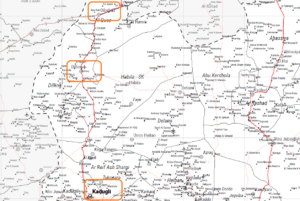‘Sudan Public Order Law still being implemented’: SIHA Network
According to the Strategic Initiative for Women in the Horn of Africa (SIHA), crimes of gender-based violence against women by Sudanese security and military forces continue to be the norm in the public and private spheres across the country.
 Young Sudanese women in downtown Khartoum (theepochtimes.com)
Young Sudanese women in downtown Khartoum (theepochtimes.com)
According to the Strategic Initiative for Women in the Horn of Africa (SIHA), crimes of gender-based violence against women by Sudanese security and military forces continue to be the norm in the public and private spheres across the country.
Mid-August, a group of people visiting a wedding in East Nile, Khartoum North, among them artist Fatima Ibrahim, were assaulted by policemen of the East Nile Police’s Community Security, SIHA Network reported in a Gender Alert yesterday.
During the reign of dictator Omar Al Bashir ousted in April 2019, the Community Security Division was known as the Sudan Public Order Law Division.
Fatima Ibrahim, better known as Marwa El Duwaliya (international Marwa), told SIHA that she and 29 others were assaulted, and she and eight other women sexually were harassed by 13 policemen of the Community Security Division.
She related how the police raided a wedding party in the East Nile neighbourhood in Khartoum North on August 15, and terrorised the guests by shooting into the air. They beat Ibrahim and the other women, and forced them, at gunpoint, to lay down on the floor, after which they lifted their dresses.
According to Marwa, she and the 29 other persons were subjected to a summary trial under the Sudanese Criminal Code for disturbance of public peace, for public nuisance, posing a threat to public servants, and obstructing them from performing their duties. They had to pay a fine of SDG30.000*.
Lack of political will
Sudan’s transitional government has more than once showed “the lack of political will to address violence against women and girls beyond tokenism”.
“Crimes of sexual and gender-based violence against women by Sudanese security – military and law enforcement continue to be the norm in the public and private spheres across the country,” SIHA commented.
“The structural violence and systematic oppression experienced by women is considered a secondary issue and is often overlooked – while the ratification of the Convention on the Elimination of all Forms of Discrimination against Women (CEDAW), and the Protocol to the African Charter on Human and Peoples’ Rights on the Rights of Women in Africa (Maputo Protocol) – remain on paper.”
SIHA urges the government and in particular the Ministry of Justice, the Ministry of Interior Affairs, and the Office of the General Prosecutor of Sudan to “challenge the persistent practice of impunity” regarding crimes committed by Sudanese law enforcement institutions.
The authorities should “repeal the laws that hinder victims and survivors from accessing justice, and enact laws to protect women and girls against sexual and gender-based violence, especially during detention, interrogation, and imprisonment”. Victims of gender-based violence should receive substantial medical and psychosocial support.
In November 2019, the Sudanese government repealed the Public Order Law, which disproportionately affected women. The move was widely welcomed. Yet, in In March this year, the director of Khartoum State Police, Lt Gen Eisa Ismail, called for the Public Order Law to be reinstated “to combat crime”. His statements sparked widespread reactions on social media.
In April this year, the Council of Ministers endorsed the ratification of CEDAW and the Maputo Protocol on the Rights of Women in Africa. Yet, the Sudanese Fiqh (Muslim jurisprudence) Academy barred the planned ratification of CEDAW in early May. The text is still to be formally ratified by the Sovereignty Council and the Council of Ministers.
* USD 1 = SDG 441.6231 at the time of posting (US Dollar middle rate quoted by the Central Bank of Sudan)











 and then
and then